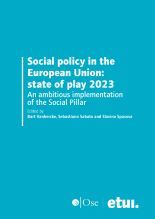Vanhercke B., Sabato S. and Spasova S. (eds.)
Social policy in the European Union: state of play 2023
Brussels, European Trade Union Institute (ETUI) and European Social Observatory (OSE), 183 p.
With the green and digital transitions having moved rapidly up the von der Leyen Commission agenda, the realisation is dawning that their success is greatly dependent on worker support. Barrosian neoliberalism is being undone, replaced by a new paradigm legitimised by the European Pillar of Social Rights. This ‘social turn’ in EU policymaking is reflected in the efforts to cement workers’ rights and increase corporate accountability in pursuit of a planet-people-profit balance backed by a green industrial policy.
The 2022 and 2023 developments described in this book reflect this paradigm shift. Workers’ incomes are now protected by a Minimum Wage Directive, the first-ever piece of legislation with the potential to boost (cross-) sectoral collective bargaining in Member States. Other initiatives include efforts towards pay transparency, increasing the representation of women on boards, and legislative measures against gender-based violence. EU countries have also, albeit through ‘soft governance’, committed to strengthen social safety nets. This includes ensuring an adequate minimum income and the launch of a European Platform for Combatting Homelessness.

